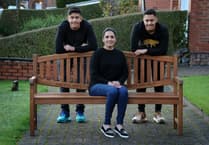‘A lifetime of service’ was how the News & Mail described West Byfleet’s Alfred Stollery in his obituary back in February, 1959.
Indeed, he certainly gave much of his time to public service and to community activities.
Reader Adrian (Dick) Bird is Alfred’s grandson. In 2001 he wrote a tribute to his grandfather (key aspects are featured here).
Alfred William Stollery was born in Waldringfield, Suffolk, in 1875, one of 11 children.
He left school at the age of 12 to scare crows in a field for a farmer, to help the family finances, and later obtained an apprenticeship with a furnishing company at Woodbridge in Suffolk.
On completing his apprenticeship he moved to London with nine shillings in his pocket, but soon realised it wouldn’t go far in the big city.
However, he obtained work from some firms in the West End and at every opportunity studied at Kensington Art School.
He later worked for a company in Oatlands Village near Weybridge, but the firm closed.
Nevertheless, the proprietor helped Alfred set up on his own in 1912 in West Byfleet.
It was not long before he became one of the village’s largest employers with cabinet makers, upholsterers, polishers, carpet fitters, seamstresses and staff at his shop in Rosemount Parade.
Alfred was multi-skilled, but specialised in restoring antique tapestries.
It is said that Lord Iveagh of Pyrford Court would not let anyone, apart from Alfred, near his own 18th-century French tapestries.
Alfred had married Alice Rebecca Penn in 1903. Alfred’s brother Issac was married to Lucy (nee Lambert). They lived in Hartlepool and had a daughter, Grace Ellen.
When she was aged just ten months, her mother Lucy died.
Because of Issac’s arduous duties as a coastguard, Alfred travelled to Hartlepool and brought the child back to West Byfleet. Later he and his wife adopted her, after which she was always known as Lucy, in memory of her birth mother.
However, on the train journey back home from Hartlepool, Alfred was subjected to abuse from some elderly ladies, who objected to a man attempting to look after a young child.
It appears they gave no consideration to the sad story of the circumstances which he told them about.
Shortly after moving to West Byfleet, Alfred became the first organist at St John’s Church. In fact, he played the organ at a tin hut in Broadoaks before St John’s Church was functional.
He established the church’s choir boys, alongside Captain Cyril Frisby VC.
The choir performed at local functions and raised money for a number of good causes.
Later, Alfred became a lay preacher, performing ecclesiastical duties at churches in the area.
It is believed Alfred served on Byfleet Parish Council and Chertsey District Council in the 1920s, and in 1928 he became the first chairman of Byfleet and Pyrford Ratepayers’ Association – now the residents’ association.
He had revitalised Byfleet Parish Day after the First World War and was its secretary for 13 years, during which time he kept a leather-bound journal detailing every aspect of this event. The journal is now with Byfleet Heritage Society.
In the 1930s Alfred founded West Byfleet Football Club, and when Woking Urban District Council was established in 1933, he was duly elected to serve.
He was its chairman in 1936-37 and oversaw all the local celebrations for George VI’s coronation.
When he retired from the council in 1946, there were numerous letters regretting his decision. Most said he was an honourable, decent and much-respected individual who would be sadly missed in the council chamber.
Another aspect of Alfred’s involvement with the community was his commitment to young people.
He was a governor of West Byfleet and Pyrford schools, and was also involved with the setting up of Fulbrook and Sheerwater schools.
In concluding his tribute to his grandfather, Adrian writes: “I am in possession of Alfred’s scrapbooks from which it is clear he was a thoroughly decent man who was held in great esteem by all who knew him.
“I was a youngish teenager when he died, but I remember him always thinking of others.
“He gave me the advice that I should always walk a mile in the other person’s shoes.
“I did not quite grasp this at the time, but now it is very clear.




